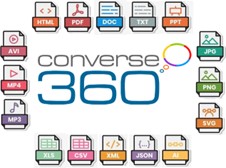Revolutionising Information Retrieval with RAG Agents
In the ever-evolving landscape of artificial intelligence (AI) and data management, Retrieval-Augmented Generation (RAG) agents stand out as a transformative technology. These agents leverage advanced AI models, vector databases, and LLM (Large Language Model) caching to provide accurate and context-aware information retrieval across diverse data formats. In this article, we'll explore the intricacies of RAG agents, their key components, and how converse360 simplifies the process of building these powerful tools through No-Code interfaces.
Understanding RAG Agents
RAG agents are AI-powered systems designed to enhance searchable information retrieval by combining the strengths of traditional information retrieval methods with the generative capabilities of LLMs. This hybrid approach allows RAG agents to fetch relevant data from extensive databases and generate contextually appropriate responses.
Imagine a speech transcript, and question(s) are asked by the end-user. If the question is clear, it is then used used to find the piece(s) of information from a database which then passes information’s to the LLM. The LLM will then create a response from the subject of the content in a friendly humanised response.

Information Splitting
converse360 uses technique called information splitting which consumes different types of formats, extracts information from them and splits the data into bitesize chunks. It can also handle and transcode media formats such as video, mp3, wav, and others. Any back-office data can be retrieved and consumed included AI wrapped services that use AI services like tensor flow, sci-kit, brain.js and LLM based models. We discuss these formats later.
The Role of Vector Databases
Vector databases play a crucial role in the functionality of RAG agents. They store and manage data in vector format, allowing for efficient similarity searches and retrieval of relevant information. By converting various data types into vectors, RAG agents can quickly access and analyse large datasets, providing precise and relevant answers. Vector data compromises of text, images, video, audio, data and consumes this data so it can be retrieved according to the relevant subject in question.
The Importance of LLM Caching
LLM caching involves storing the outputs of LLMs to improve the efficiency and speed of data retrieval. By caching frequently accessed data, RAG agents can reduce the computational load and provide quicker responses. This technique ensures that users receive timely and accurate information without the need for repeated processing of the same queries.
Multi-Language LLM Output
converse360 uses a mechanism of multi-language optimistic output, which eliminates the translation LLM mean time where outputs are consistent and have been similarly generated before. This can in some cases offer a 4,000% improvement to the performance, speeding up interactions.
Exploring Diverse Data Formats
RAG agents are versatile tools capable of handling a wide range of data formats. Let's delve into some of the key formats and how they can be integrated into a RAG agent.
Web Pages and Web Content Markup
Web pages are rich sources of information. RAG agents can crawl and index web content, extracting relevant data from HTML markup. This allows users to retrieve information from a vast array of online sources quickly and accurately.
Crawling Site Maps and Spidering
Site maps provide a structured overview of a website's content. By crawling site maps, RAG agents can systematically explore and index all available web pages, ensuring comprehensive coverage and efficient data retrieval.
Business Documents, Technical PDFs, Word Documents, and PowerPoints
RAG agents can extract and index text from various document formats, including PDFs, Word documents, and PowerPoints. This capability enables users to search and retrieve information from business reports, presentations, and other important documents.
Excel Data Structures with Mapped Labels
Excel files are commonly used for data analysis and reporting. RAG agents can process and index Excel spreadsheets, allowing users to perform complex queries and retrieve specific data points from extensive datasets.
- Generating response outcomes
- Generating classifier event maps for private controlled output
- Generating word and numeric index references for NLP process hand-off
Text Documents with Meta Data
Simple text documents are another valuable source of information. RAG agents can parse and index text files, making it easy to retrieve specific information from notes, logs, and other text-based records.
JSON API Office Data
RAG agents can integrate with JSON APIs to access and retrieve structured data from back-office systems. This capability is essential for organisations looking to streamline their operations and provide seamless access to critical business data.
Podcasts and Video/Audio Content
RAG agents can transcribe and index audio and video content, making it possible to retrieve information from podcasts, webinars, and other multimedia sources. This feature enhances the accessibility of audio-visual data, enabling users to search and retrieve specific segments of content.
Images and Meta Data
RAG agents can also index images and their associated metadata. By analysing visual content and metadata, these agents can provide relevant information and insights based on image content, enhancing the breadth of data retrieval capabilities.
- Medical Images with Text
- HR forms
- Damaged property
- Cards and certificates
- Scanned Documents as Images
RAG Enabled - Speech Elevation
RAG agents integrated with speech recognition can transcribe spoken content, making it searchable and analysable. The challenge is that the RAG’s are not domain aware or tuned with speech.
converse360's powerful auto-tune feature allows for intelligent speech tuning, ensuring that the transcribed content is accurate and aligned with user expectations. This capability is particularly useful for applications involving customer service and virtual assistants.
The system can consume and break down RAG terms into unigrams, and tune in parallel during the rag process. converse360 assesses phonetic level words fortuning and interpretation with the target recognizer, using word weighting analysis and adjustment. Such a method is currently unique to converse360 in the conversational AI space today.
Building Powerful RAG Agents with Converse360
converse360 simplifies the process of building RAG agents, offering a user-friendly platform that integrates advanced AI technologies, vector databases, and LLM caching. Some example of how converse360 makes it easy to create powerful RAG agents:
User-Friendly Interface
We provide an intuitive interface that allows users to build and configure RAG agents without requiring extensive technical knowledge. The platform’s drag-and-drop functionality and pre-built templates streamline the setup process, making it accessible to non-technical users.
Seamless Integration with Diverse Data Sources
converse360 supports integration with a wide range of data sources, including web pages, documents, spreadsheets, APIs, multimedia content, images, and speech. This flexibility ensures that users can build comprehensive RAG agents that cater to their specific needs.
Advanced AI and Machine Learning Capabilities
converse360 leverages cutting-edge AI and machine learning technologies to enhance the performance of RAG agents. The platform’s built-in vector databases and LLM caching capabilities ensure efficient data retrieval and accurate response generation.
Continuous Improvement and Optimization
converse360 enables users to refine and optimize their RAG agents through iterative testing and feedback. The platform's analytics and reporting tools provide valuable insights into agent performance, helping users make informed decisions and improve their systems over time.
Data Control & Guardrails
converse360 places a strong emphasis on data control and ethical AI usage. The platform includes robust guardrails to ensure that the data retrieved and generated by RAG agents is accurate, unbiased, and secure. Users can set parameters and constraints to guide the behaviour of RAG agents, ensuring compliance with industry standards and regulations.
Real-World Applications of RAG and Multi-Rag Agents
Enhancing Customer Support
RAG agents can transform customer support by providing quick and accurate responses to customer enquiries. By integrating with knowledge bases and customer service platforms, RAG agents can handle a wide range of queries, improving customer satisfaction and reducing support costs.
Streamlining Business Operations
In industries such as insurance, logistics, hospitality, local government and retail, RAG agents can streamline operations by automating data retrieval and analysis. This capability allows organizations to make data-driven decisions, enhance productivity, and reduce operational costs.
Enriching Educational Experiences
In the education sector, RAG agents can provide personalised learning experiences by retrieving relevant information from educational resources. Students and educators can benefit from quick access to study materials, research papers, and other educational content.
Innovating Legal Services
Legal professionals can leverage RAG agents to streamline legal research, document analysis, and contract management. By integrating with legal databases and document repositories, RAG agents can provide precise and relevant information, enhancing the efficiency of legal services.
Transforming Insurance
- Claim processing: AI prompts that guide RAG agents to review and validate insurance claims, detect potential fraud, and expedite the claims settlement process.
- Customer support: Chatbots and virtual assistants that provide policy information, answer customer enquiries, and assist with filing claims.
- Risk assessment: Use prompts to analyse data and predict risk factors for individual policies, improving underwriting accuracy.
Advancing Social Housing
- Tenant management: AI prompts that help manage tenant inquiries, maintenance requests, and lease agreements.
- Repairs: Use prompts to optimize enquiry triaging and allocate resources once the criticality is known.
- Policy compliance: Ensure that housing policies and regulations are met through accurate documentation and reporting.
Revolutionising Retail
- Personalised product recommendations: AI prompts that generate tailored product suggestions for customers based on their preferences and purchase history.
- Customer support: Chatbots and virtual assistants that handle customer enquiries, process orders, and manage returns.
- Sentiment analysis: Use prompts to analyse customer reviews and feedback, identifying trends and areas for improvement.
Conclusion
RAG agents, powered by advanced AI technologies, vector databases, and LLM caching, are revolutionising the way we retrieve and interact with information. converse360 makes it easy to build and configure these powerful tools, enabling organisations across various industries to harness the full potential of RAG agents. As the technology continues to evolve, the role of RAG agents will only grow in significance, shaping the future of information retrieval and data management.
More articles
Guardrail Guide – Protecting your audience, brand, reputation & ensuring legal compliance
Protection against prompt attacks, subject context consistency, PII exposure, competitor mentions, profanities and hallucinations...
Building Powerful RAG Agents: Vector Databases and LLM Caching
RAG agents combine the strengths of traditional information retrieval methods with the generative capabilities of LLMs...
Agent Assist: Empower Customer Service with Real-Time Guidance
As customer expectations rise, the need for effective tools to assist agents becomes crucial...







